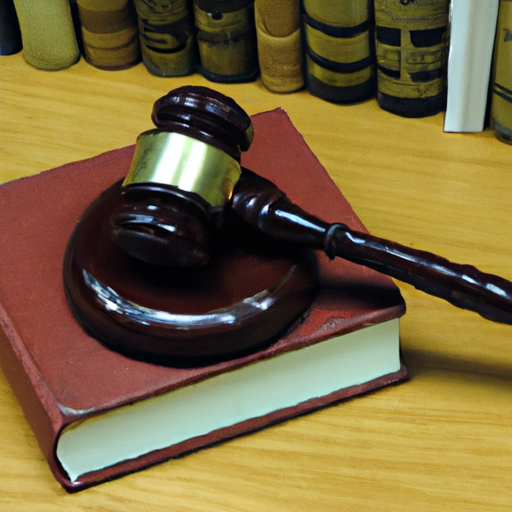In need of an intellectual property lawyer in Sandy, Utah? Look no further. This article aims to provide you with a comprehensive understanding of intellectual property law and its importance for businesses and business owners. With a deep understanding of the target audience—individuals with IP issues—we strive to create informative content that explains complex legal concepts in a clear and accessible manner. By sharing engaging case studies and real-life scenarios, we aim to instill confidence in our expertise and experience, setting ourselves apart from others in the field. Our goal is to address common legal concerns directly, providing reassurance and guidance while humanizing our practice through personal stories that create emotional connections. So, if you are looking for assistance with intellectual property matters, do not hesitate to reach out to us. Call the lawyer listed on this post and take the next step towards safeguarding your intellectual property rights.
Overview of Intellectual Property Law
Definition of intellectual property
Intellectual property refers to creations of the mind, such as inventions, designs, symbols, words, and artistic works, that are protected by law. It includes various legal rights, such as patents, trademarks, copyrights, and trade secrets.
Importance of protecting intellectual property
Protecting intellectual property is crucial for individuals and businesses alike. It provides the legal means to safeguard valuable ideas, inventions, and creative works from unauthorized use or exploitation by others. By protecting intellectual property, creators and inventors can benefit from their innovations, ensuring fair compensation and recognition for their efforts.
Types of intellectual property
There are several types of intellectual property protection, each serving a specific purpose:
-
Patents: These protect inventions, processes, and new technologies, granting the inventor exclusive rights to their creation for a limited time.
-
Trademarks: Trademarks protect brands and logos, distinguishing goods and services from those of competitors.
-
Copyrights: Copyrights protect original works of authorship, such as literary, artistic, and musical creations.
-
Trade secrets: Trade secrets include confidential business information, such as formulas, techniques, or customer lists that provide a competitive advantage.
These different types of intellectual property rights serve to encourage innovation, creativity, and economic growth.
Services Offered by an Intellectual Property Lawyer
Trademark registration and enforcement
An intellectual property lawyer can assist with the registration of trademarks to ensure the exclusive rights to a brand or logo. They can conduct comprehensive searches to determine if a trademark is already in use and guide clients through the application process. Additionally, they can help enforce trademarks by taking legal action against infringers.
Copyright registration and enforcement
Copyright registration can provide additional protection for creative works. An intellectual property lawyer can help authors, artists, and creators register their copyrights and provide guidance on enforcement strategies, including pursuing legal action against those who infringe on their copyrighted works.
Patent application and prosecution
For inventors and businesses seeking to protect their innovative ideas, an intellectual property lawyer can assist with the complex process of patent application and prosecution. They can help draft patent applications, navigate the examination process, and ensure compliance with relevant laws and regulations.
Trade secret protection
Trade secrets are valuable assets that require specific measures to protect them from unauthorized disclosure or use. An intellectual property lawyer can help develop comprehensive trade secret protection strategies, including employee agreements, non-disclosure agreements, and other contractual arrangements.
Licensing and contracts
Intellectual property lawyers can provide guidance on licensing agreements, helping clients negotiate terms and ensure their rights are protected. They can also review and draft contracts involving intellectual property, such as technology transfer agreements, franchise agreements, and distribution agreements.
Litigation and dispute resolution
In cases of intellectual property disputes, an experienced intellectual property lawyer can represent clients in litigation and alternative dispute resolution methods, such as negotiation, mediation, or arbitration. They can help clients navigate complex legal processes, protect their rights, and seek remedies for infringement or misappropriation of intellectual property.

Benefits of Hiring an Intellectual Property Lawyer
Expertise in intellectual property laws
Intellectual property laws are complex and constantly evolving. By hiring an intellectual property lawyer, you gain access to their in-depth knowledge and expertise in the field. They stay updated with the latest developments and can provide valuable advice tailored to your specific needs.
Guidance in choosing the right type of intellectual property protection
Determining the most suitable type of intellectual property protection can be challenging. An intellectual property lawyer can assess your unique circumstances and guide you in choosing the appropriate type of protection for your creations or inventions. This ensures that your intellectual property is safeguarded effectively.
Efficient and accurate registration process
Navigating the application process for trademarks, copyrights, or patents requires attention to detail and adherence to strict legal requirements. An intellectual property lawyer can ensure that your applications are prepared accurately and submitted timely, avoiding potential delays or rejections.
Enforcement of intellectual property rights
When intellectual property rights are infringed upon, an intellectual property lawyer can take swift legal action to protect your rights. They have the experience and knowledge to identify and respond to infringements, maximizing the chances of a successful resolution.
Reduced risk of legal disputes
By proactively seeking advice from an intellectual property lawyer, you can minimize the risk of intellectual property disputes. They can help identify potential infringement risks, conduct comprehensive searches, and provide guidance on avoiding conflicts with existing intellectual property rights.
Maximizing the value of intellectual property assets
An intellectual property lawyer can assist in assessing the value of your intellectual property assets and developing strategies to maximize their potential. They can provide advice on licensing, commercialization, and strategic partnerships, helping you leverage your intellectual property for business growth and profitability.
Understanding Trademark Law
Definition and purpose of trademarks
A trademark is a symbol, design, word, or phrase that distinguishes products or services of one company from those of others. Its purpose is to enable consumers to easily identify and associate specific goods or services with a particular brand, ensuring their quality and origin.
Trademark application process
Registering a trademark involves several steps, and an intellectual property lawyer can guide you through the process. They can conduct a thorough search to ensure the availability of the desired trademark, prepare the necessary application documents, and submit them to the appropriate intellectual property office.
Trademark infringement and enforcement
If someone uses a trademark that is confusingly similar to yours, it may constitute trademark infringement. An intellectual property lawyer can help you enforce your trademark rights by sending cease and desist letters, initiating legal proceedings, and seeking damages or injunctions against infringers.
Trademark portfolio management
For businesses with multiple trademarks, managing a trademark portfolio can be challenging. An intellectual property lawyer can assist in maintaining and protecting your trademarks, monitoring for potential infringements, and developing strategies to strengthen and expand your trademark portfolio.
Copyright Law Explained
What is copyright?
Copyright refers to the legal protection granted to original works of authorship. It provides exclusive rights to authors, artists, and creators, enabling them to control how their works are used and ensuring fair compensation for their efforts.
Copyright registration process
While copyright protection exists automatically upon the creation of a work, registering a copyright provides additional benefits. An intellectual property lawyer can assist in the registration process, helping to establish a public record of your copyright and ensuring stronger protection against infringement.
Copyright infringement and enforcement
Copyright infringement occurs when someone uses, reproduces, distributes, or displays a copyrighted work without permission. An intellectual property lawyer can help enforce your copyright by sending cease and desist letters, filing infringement lawsuits, and seeking remedies for damages.
Fair use and other copyright exceptions
Fair use is a legal doctrine that allows limited use of copyrighted materials without permission for purposes such as criticism, commentary, or education. An intellectual property lawyer can help determine whether a particular use qualifies as fair use or falls under other copyright exceptions.
Navigating the World of Patents
The importance of patents
Patents play a crucial role in incentivizing innovation by granting inventors exclusive rights to their creations for a limited time. They encourage technological advancements and provide a legal framework for inventors to protect and commercialize their inventions.
Types of patents
There are three main types of patents: utility patents, design patents, and plant patents. Utility patents protect new processes, machines, or compositions of matter, while design patents protect unique designs for manufactured products. Plant patents protect new varieties of plants.
Patent application process
Applying for a patent involves detailed documentation and adherence to strict legal requirements. An intellectual property lawyer can help prepare and file a patent application, ensuring that it meets the necessary criteria and provides the best chance of approval.
Patent prosecution and maintenance
Once a patent application is filed, it goes through a prosecution process, including examination and potential amendments. An intellectual property lawyer can navigate this process, responding to examiner’s objections or rejections and maximizing the chances of obtaining a granted patent. They can also assist with patent maintenance, including payment of fees and compliance with maintenance requirements.
Patent infringement and defense
If someone uses, makes, sells, or imports an invention that is covered by your patent, it may constitute patent infringement. An intellectual property lawyer can help enforce your patent rights, pursuing legal action against infringers and seeking remedies for damages. They can also defend against allegations of patent infringement and challenge the validity of existing patents.

Trade Secrets and Confidential Information
Definition and importance of trade secrets
Trade secrets include valuable business information that is not generally known or readily ascertainable by others, providing a competitive advantage. Trade secrets may include formulas, manufacturing processes, customer lists, marketing strategies, or other confidential business information.
Steps to protect trade secrets
To protect trade secrets, businesses should implement robust security measures and confidentiality policies. An intellectual property lawyer can help develop and implement these measures, such as confidentiality agreements, employee training programs, and physical or digital safeguards.
Trade secret misappropriation
Misappropriation occurs when someone acquires, uses, or discloses trade secrets without authorization. If trade secret misappropriation occurs, an intellectual property lawyer can assist in pursuing legal action against the responsible party, seeking injunctive relief and monetary damages.
Litigating trade secret disputes
In cases of trade secret disputes, an intellectual property lawyer can provide representation and guidance throughout the litigation process. They can help gather evidence, prepare legal documents, and present a compelling case to protect your trade secrets and seek appropriate remedies.
Negotiating Licensing Agreements and Contracts
Advantages of licensing intellectual property
Licensing intellectual property allows businesses to generate additional revenue streams by granting others permission to use their intellectual property. An intellectual property lawyer can provide guidance on licensing strategies, ensuring that your rights are protected and that you receive fair compensation for the use of your intellectual property.
Drafting licensing agreements
An intellectual property lawyer can assist in drafting comprehensive licensing agreements that cover all necessary provisions, including the scope of the license, royalties or licensing fees, usage restrictions, and termination clauses. They can tailor agreements to suit your specific business requirements and protect your intellectual property rights.
Negotiation and review of contracts
When entering into contracts involving intellectual property, such as technology transfer agreements or distribution agreements, it is essential to have an intellectual property lawyer review and negotiate the terms. They can ensure that your rights are protected and that the contract accurately reflects your intentions and expectations.
Intellectual property clauses in business contracts
An intellectual property lawyer can help businesses incorporate intellectual property clauses into their contracts to safeguard their rights and avoid potential disputes. These clauses may cover ownership of intellectual property created during the course of employment or specify confidentiality obligations and protection of trade secrets.

Handling Intellectual Property Litigation
Common intellectual property disputes
Intellectual property disputes can arise from various situations, including trademark infringement, copyright infringement, patent disputes, trade secret misappropriation, or breaches of licensing agreements. An intellectual property lawyer can handle these disputes and provide representation tailored to your specific case.
Pre-litigation strategies
Before initiating litigation, an intellectual property lawyer can help explore pre-litigation strategies to resolve disputes amicably. This may involve sending cease and desist letters, engaging in negotiation or mediation, or engaging in alternative dispute resolution methods to avoid costly and time-consuming litigation.
Filing and responding to lawsuits
If litigation becomes necessary, an intellectual property lawyer can guide you through the process of filing or responding to lawsuits. They can prepare and file legal documents, conduct legal research, gather evidence, and present a strong case on your behalf.
Alternative dispute resolution methods
Litigation can be resource-intensive, and alternative dispute resolution methods, such as negotiation, mediation, or arbitration, can offer more cost-effective and efficient solutions. An intellectual property lawyer can assess the suitability of these methods and represent your interests throughout the process.
Frequently Asked Questions about Intellectual Property Law
What is the duration of copyright protection?
Copyright protection typically lasts for the lifetime of the author plus an additional 70 years. In the case of anonymous works or works made for hire, copyright protection lasts for 95 years from the date of publication or 120 years from the date of creation, whichever is shorter.
Can I trademark a slogan?
Yes, slogans can be trademarked if they meet the criteria for trademark protection. A slogan should be distinctive, not merely descriptive of the goods or services, and must not be similar to an existing trademark in the same industry or field.
How can I protect my trade secrets?
To protect trade secrets, businesses should implement strict confidentiality measures, such as non-disclosure agreements, restricted access to sensitive information, and employee training. It is essential to keep trade secrets confidential and take action against any unauthorized use or disclosure.
Should I file a provisional or non-provisional patent application?
The decision to file a provisional or non-provisional patent application depends on your specific circumstances. A provisional patent application provides a filing date and allows you to use the term “patent pending” while you develop your invention further. A non-provisional patent application provides full patent protection and undergoes examination.
What damages can I recover in an intellectual property lawsuit?
In an intellectual property lawsuit, you may be entitled to various types of damages, including actual damages, statutory damages, and, in some cases, exemplary or punitive damages. The specific damages available depend on the nature of the intellectual property right and the circumstances of the infringement.
These frequently asked questions provide a general understanding of common concerns related to intellectual property law. For specific legal advice tailored to your situation, it is best to consult with an experienced intellectual property lawyer.



















































